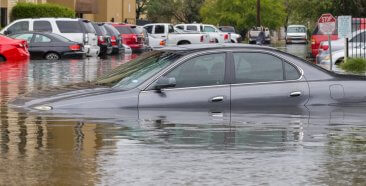
You’ve just had your second fender-bender this year and you’d rather not inform the DMV and your auto insurance company. The other driver’s vehicle has less damage than your vehicle and he’s cool with not notifying either one as well. Or, so he says.
While this may seem like the perfect way to avoid another increase in your car insurance premiums and adding more negative points on your driving record, it may actually turn out to be a big mistake.
First, you may want to consider the possible ramifications and penalties that await you for failing to report a car accident in California before making a snap decision. In short, you have a legal obligation to report accidents that fall under certain guidelines.
According to the California Department of Motor Vehicles (DMV), California law requires traffic accidents occurring on a California street, highway or private property to be reported within 10 days of the incident, regardless of who’s at fault. Not reporting the accident within the allotted time period by filing an SR-1 form with the DMV could lead to the suspension of your driver’s license.
When You Are Obligated to Report a Car Accident
In most states, you are legally obligated to report any car accidents that result in injury, death, or property damage above a certain amount, typically from $500 to $3,000. Additionally, most auto insurance policies require you to report any accident, regardless of fault or severity, as soon as possible. Your insurance policy will outline the terms of your coverage and the requirements for reporting an accident.
When You Should Report a Car Crash to the Police
If you happen to be in a vehicle collision, it is imperative that you come to a complete stop. Failure to do so could result in being found guilty of a “hit and run” offense, which carries severe consequences. Moreover, if anyone is hurt, they may require assistance. Therefore, it is crucial to immediately dial 9-1-1 and report the incident to the police or California Highway Patrol (CHP).
Additionally, you must provide the other driver(s) or involved individuals, as well as law enforcement officers, with your driver’s license, vehicle registration card, proof of financial responsibility, and current address. Typically, evidence of financial responsibility comprises an insurance company name and a policy number. Failure to produce this documentation may lead to a citation and fine.
Why Filling a Police Report Might Be Helpful
The value of a police report lies in its impartiality, which makes it more useful than relying on the at-fault driver’s memory of the event or filing a claim. In the event that you decide to pursue a personal injury claim, the police report is an essential document that your insurance company will require.
The police report provides a fair and objective account of the accident, including details such as the accident’s location, date and time, vehicle and property damage, injuries sustained by drivers, passengers, and others, statements from both drivers involved, and information from witnesses who saw the accident. Additionally, it documents any environmental factors that may have contributed to the accident.
In the event of an auto accident, it is important to contact the local police department immediately to file a report. When the police officer arrives at the accident scene, provide them with a detailed account of what occurred and answer any questions they may have. The responding officer will interview the other driver and any witnesses, then determine the cause of the accident. Be sure to ask for a copy of the traffic collision report for your records.
If the accident is a minor collision and there are no reported injuries, the police may not respond to the scene. In such cases, it is essential to file an accident report at the police station within 24 hours.
The accident report serves as evidence that the other driver was present at the scene of the accident and involved in the accident. It is mandatory to obtain a police report when seeking compensation for damages, particularly if the at-fault driver denies involvement, lacks insurance coverage, refuses to make up for financial compensation, or flees the scene.
Do Minor Vehicle Accidents Need to Be Reported?
Even minor car accidents should be reported to your insurance company. While you may be tempted to handle the situation on your own, it’s important to remember that minor accidents can cause more damage than you can see. Even if there is no visible damage to your vehicle or any other property, there could still be underlying damage that could cause issues down the line. Reporting even the smallest accident to your insurance company can protect you in case any future complications manifest later on.
What If the Other Driver Agreed to Not File a Claim for the Minor Accident?
If the other driver agreed not to file a claim for a minor accident, you still need to report the accident to your insurance company. Even if the damage seems minor, it’s always best to be safe and report the accident. In some cases, the other driver may change their mind and decide to file a claim at a later date, and you could be left without coverage.
Accident Guidelines That Require the Filing of a Report
The law states you are required to file the SR-1 if:
- There is clearly damage in excess of $750 to the vehicles or other property.
- Injury or death to any party in either vehicle results from the accident.
Furthermore, the DMV states:
“This report must be made in addition to any other report filed with a law enforcement agency, insurance company, or the California Highway Patrol (CHP) as their reports do not satisfy the state filing requirements.”
Your plans to avoid reporting the accident could also take a turn for the worse, in the event your vehicle becomes disabled – making it no longer drivable – and blocking lanes of traffic. Under this scenario, it’s more than likely law enforcement personnel will be dispatched to the scene to get you towed. And, you can rest assured the responding officer will file an accident report himself, which will automatically go to the DMV.
Of course, certain circumstances could prevent you from making the report within the required 10 days, such as having been injured in the accident. Should that be the case, a passenger riding in your vehicle could file the report for you or have a third party, including an attorney, make it for you.
Can I Report a Car Accident After 24 Hours?
In California, you must report an incident within 24 hours when involved in any accident resulting in injuries to or death. Failure to do so may result in your insurance claim being denied. Delayed reporting may allow insurers to dispute the extent of any injuries or damages you claim, arguing that they occurred after the accident.
If someone sustains injuries in a car accident, it is mandatory to report the incident to the police within 24 hours, as per Section 20008 of the California Vehicle Code. Usually, the obligation to report the accident to the police is fulfilled by calling 911 from the accident scene. However, if 911 was not called, it may be necessary to contact the California Highway Patrol or the local police department and comply with their instructions on how to file a car accident report.
Penalties for Not Reporting an Accident in California
Failure to report a “reportable” accident typically results in suspension of your driving privilege.
However, according to California law, should you have an accident and leave the scene without complying with any portion of California Vehicle Code Section 20002, you could be charged with a misdemeanor punishable by a jail term of up to six months, or be fined up to $1,000, or both.
Keep in mind – just because the other driver initially agreed to bypass his or her auto insurance company and not file a report with the DMV, doesn’t mean they won’t have a change of heart if they find out the damage to their vehicle is more extensive than they originally thought. If you exchanged insurance or driver’s license information along with your phone number, you could be staring at a very scary outcome.
Not only could the driver of the other car lay all the blame on you for the accident, he could report the fender-bender to his auto insurance company, claiming you left the scene after hitting him. As things continue to spiral against you, your insurance company will undoubtedly find out and could get really grumpy if the “agreeable driver” files a damage claim against you through them for an unreported accident.
As unpleasant as it may be to report a minor accident to your auto insurer and the DMV, it could save you a lot more, including policy cancellation, a fine and/or six months in jail – even a lawsuit. In the end, it really isn’t worth the risk.
Finding Affordable Car Insurance Online
Your independent Freeway Insurance agent will be able to quote you the best rates for however many vehicles with safe driving reputations you bring us. That’s because we can shop for rates from several major insurance carriers for the most competitive rates of all.
Call us at (800) 777-5620 or meet with an agent at a Freeway Insurance office near you. Or get a quick online quote for car insurance before purchasing that new or used car choice.



